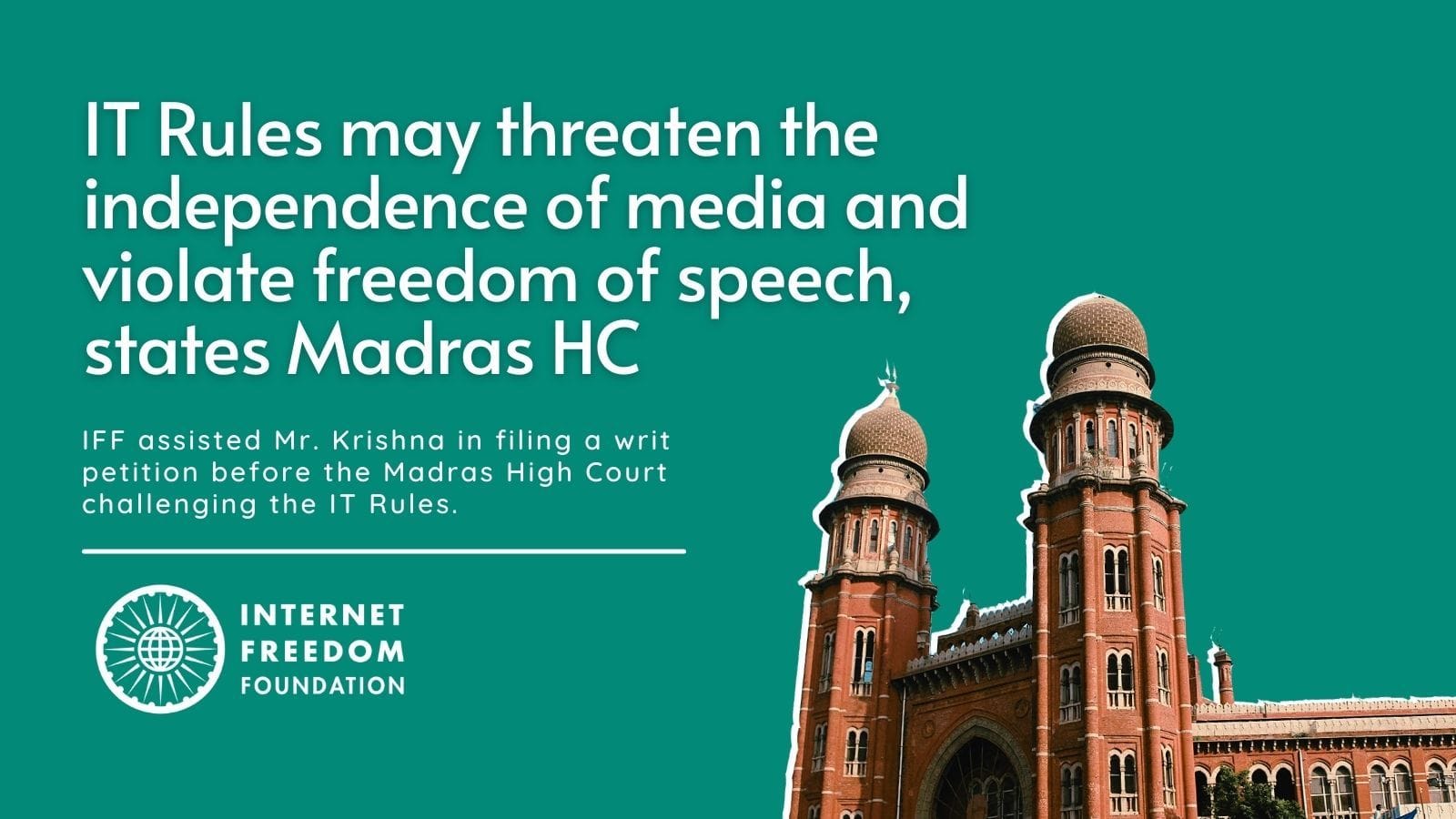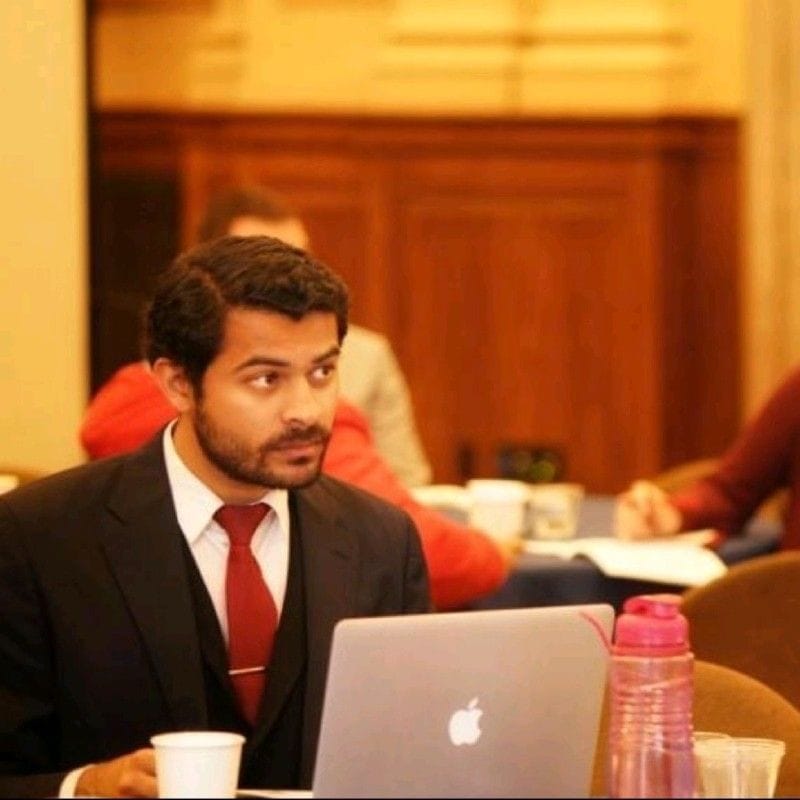
Tl;dr
Mr T. M. Krishna, a prominent Carnatic music vocalist, cultural critic, and writer, had approached us to file a writ petition before the Madras High Court challenging the entirety of the IT Rules, 2021. The writ petition was admitted on June 10, 2021. On September 16,2021 the Madras High Court heard the counsels for the parties including Mr Rajshekhar Rao who represented Mr T.M Krishna. The Court also found merit in Mr Krishna’s contention that Part II of the Rules violated the right to speech, and held that any action taken under Rule 3 read with Rule 7 shall be subject to the decision in the petition. The Court also affirmed the previous stay on Rule 9. The Court has now listed these cases for final hearing on October 27, 2021.
Background
On February 25, 2021, the Ministry of Electronics and Information Technology and the Ministry of Information and Broadcasting notified the Information Technology (Intermediary Guidelines and Digital Media Ethics Code) Rules, 2021 (‘IT Rules/the Rules’). We have provided a deep dive analysis of IT Rules, where we have pointed out how the Rules are unconstitutional, undemocratic and how they fundamentally change the experience of Indians on the internet.
As a recap, Part-I of the Rules provides the definition clause. Part-II regulates intermediaries such as Facebook, WhatsApp and Twitter and imposes upon them the due diligence obligations such as the obligation to identify the ‘originator’ of a message or the obligation to deploy technology-based measures to identify and flag unlawful information proactively. Rule 3 imposes obligations related to content moderation on the social media platforms. Rule 7 threatens that if an intermediary fails to comply with its obligations, it shall be liable for punishment under any law in force, including the provisions of the Indian Penal Code, 1860.
Part-III of the Rules regulates publishers of news and current affairs content (Digital News Media) and publishers of online curated content (OTT platforms). Rule 9(1), which is contained in Part-III of the Rules, requires Digital News Media and OTT platforms to adhere to a Code of Ethics laid down in the Appendix annexed to the Rules. Rule 9(3) provides a three-tier grievance redressal mechanism that allows anyone to raise a complaint if Digital News Media/OTT platforms do not comply with the Code of Ethics. At the top of the 3-tier structure is an Inter-Departmental Committee that consists only of bureaucrats working for the central government. This committee recommend MIB to, amongst other things, warn, censure, admonish or reprimand the publisher, and even delete or modify content!
T.M. Krishna challenged the Rules in the Madras High Court
In June 2021, Mr. T.M. Krishna approached the Madras High Court, challenging the constitutionality of IT Rules. In the words of Mr. Krishna, IT Rules are particularly harmful to artists like him since the chilling effect the rules create “tend to altogether quell the creative process and makes it impossible for a person to think imaginatively, beyond conventional boundaries, and create art that is politically and socially salient.”
We assisted Mr. Krishna in filing a writ petition before the Madras High Court challenging the IT Rules on five major grounds:
- They violate freedom of speech under Article 19(1)(a) of the Constitution;
- They violate the freedom to practice any profession under Article 19(1)(g) of the Constitution;
- They violate the fundamental right to privacy under Article 21 of the Constitution;
- They are manifestly arbitrary and suffer from excessive delegation, thus violating Article 14 of the Constitution; and
- They are ultra vires (i.e. beyond the scope of) the Information Technology Act, 2000;
Mr. Rao made submissions in relation to Part II of the Rules
On June 10, 2021, Mr Krishna's petition was listed for the first time. On that day, the Madras High Court issued notice. Subsequently, the Respondents, the Ministry of Electronic and Information Technology (‘MeitY’’) and Ministry of Information and Broadcasting (‘MIB’) filed their respective replies, after a delay of almost 8 weeks, on August 25 and August 26. The affidavit filed by MietY defended Part II of the IT Rules, 2021 which seeks to regulate intermediaries. Whereas, the affidavit filed by MIB defended Part III of the Rules which seeks to regulate digital new media and OTT platforms.
The matter came up for hearing on September 16, 2021. The Court heard extensive submissions from the counsels, including Mr Rajshekhar Rao who was representing Mr TM Krishna.
Since the matter before the Bombay High Court dealt only with Part III of the IT Rules, and the petition in the connected matter before the Madras High Court also primarily relates to a challenge to Part III of the IT Rules, Mr Rao also made detailed submissions on Part II. He argued that Part II of the IT Rules is a classic case of slowly taking away a user’s constitutional rights because they indirectly coerce an intermediary to apply its own mind and take down user-content, lest the intermediary loses its safe harbour or faces criminal prosecution. The Court was persuaded to issue the following order :
“12. ... there is substantial basis to the petitioners' assertion that Article 19 (1) (a) of the Constitution may be infringed in how the Rules may be coercively applied to intermediaries.
13. ...Though the petitions have not been brought by hosts of website platforms, social media platforms on the website are used by one and sundry and there is a genuine apprehension, as the petitioners' suggest, that a wink or a nod from appropriate quarters may result in the platform being inaccessible to a citizen.
14. Accordingly, if there is any action taken in terms of Rule 3 of the said Rules read with Rule 7 thereof during the interregnum, it will abide by the result of the petitions and further orders herein.”
A previous stay on Rule 9 was affirmed
Mr Rao made submissions in relation to Part III of the IT Rules and submitted that operation of Rules 9(1) and 9(3) be stayed in accordance with the order dated August 14, 2021 passed by the Bombay High Court in Agij Promotion of Nineteenonea Media Pvt. Ltd. & Ors. V. Union of India for reasons that it prima facie violated Article 19(1)(a) and is ultra vires the IT Act, 2000. In relation to Part III of the Rules, the Chief Justice of the Madras High Court issued the following order:
“For understandable reasons, the petitioners are wary of the oversight mechanism of the Central Government indicated as the final tier of the process of regulation. Prima facie, there is substance in the petitioners' grievance that an oversight mechanism to control the media by the government may rob the media of its independence and the fourth pillar, so to say, of democracy may not at all be there.
Nothing more need be said on such aspect of the matter since the High Court of Judicature at Bombay, by an order dated August 14, 2021, has stayed the operation of sub-rules (1) and (3) of Rule 9 of the said Rules of 2021.”
Conclusion
The case is now listed for October 27, 2021 for final hearing. The interim decision passed by the Madras High Court is welcomed. Like the decision by the Bombay High Court, it provides much needed relief to users on the internet, news writers, editors and content creators. However, this is an interim relief and final hearing awaits. We will continue to provide legal support to Mr T.M Krishna and LiveLaw Media Pvt. Ltd., whom we are representing before the Kerala High Court, in their efforts to protect the right to speech and privacy of Indians on the internet.
We thank Mr. T. M. Krishna for giving us an opportunity to lend our expertise in this important case and are deeply grateful to all the lawyers who worked on this petition and especially Senior Advocate, Rajshekhar Rao who led the legal team, comprising Suhrith Parthasarathy, Vrinda Bhandari, Abhinav Sekhri, Tanmay Singh, Krishnesh Bapat and Anandita Mishra.
Important Documents
- Madras High Court order dated September 17th, 2021 (link)
- Previous post titled 'Deep dive : How the intermediaries rules are anti-democratic and unconstitutional' dated 27th February 2021 (link)
- Previous post titled ‘Madras High Court issues notice in petition challenging the Intermediary Rules 2021 by T. M. Krishna’ dated 10th June 2021(link)
- Previous post titled “Kerala HC restrains coercive action on the operation of Part III of the Intermediaries Rules, 2021 for LiveLaw” dated 10th March 2021. (link)
- A copy of the Counter Affidavit of the Ministry of Electronics and Information Technology in respect of Part II of the IT Rules (link)A copy of the Counter Affidavit of the Ministry of Information and Broadcasting in respect of Part III of the IT Rules (link)

